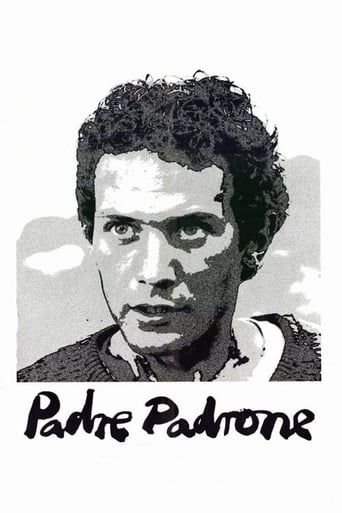gavin6942
The true story of the life of Gavino Ledda, the son of a Sardinian shepherd, and how he managed to escape his harsh, almost barbaric existence by slowly educating himself, despite violent opposition from his brutal father.Janet Maslin praised the film and wrote, "Padre Padrone is stirringly affirmative. It's also a bit simple: The patriarchal behavior of Gavino's father is so readily accepted as an unfathomable given constant that the film never offers much insight into the man or the culture that fostered him. Intriguingly aberrant behavior is chalked up to tradition, and thus robbed of some of its ferocity. But the film is vivid and very moving, coarse but seldom blunt, and filled with raw landscapes that underscore the naturalness and inevitability of the father-son rituals it depicts." Maslin may not be all too familiar with the tradition. If she was, she would appreciate why it needs no explanation. I don't know Sardinia specifically, but I know Sicily, and this behavior would just be expected. There is no deeper psychology behind it. What makes this film interesting is not that a young man overcomes his father (many do that), but that he became a Sardinian linguist... because seriously, who does that? I was not even aware they had their own language.
Didier (Didier-Becu)
Vittorio and Paolo Taviani are surely one of the most important Italian directors ever and just like all the great masters they often have their not so brilliant movies, but "Padre Pardone" certainly belongs to the best they ever made. It's all based on a true story and sometimes people tend to forget that there are places that God forget. In an agricultural area in Sardinia some folks pretend it's better to take care of the sheeps rather than scoring well at school. The young Gavino (Fabrizio Forte) goes to his school but one day he's father comes in the classroom telling him that his schooldays are over and that it is time to take up his duty as shepherd. The brothers Taviani are masters in filming the useless factors of the job as we see a young boy who absolutely has no interest in the job he got by his father, and we see some explicit scenes in where the almighty father beat his children. Schoking that's for sure and if the Gavino grows older we see his hunger to learn something (the poor boy couldn't read) as soon as he must enter the world of the army which is in total contrast with the world of the hills where sheep run. The story itself is rather hard to bear and you often shake your head by disbelief but still the Taviani-brothers are opting for a sober and poetic approach of the problem that it looks like you're viewing some touristic documentary of an area that God forgot. "Padre pardone" is certainly the kind of movie that will have both its lovers and enemies but having said that, you know that "Padre Pardone" belongs to the classic section of the Italian cinema that will never be forgotten.
Rosaluck
I saw this movie more than 20 years ago, but I have never forgotten it. There is no need for me to repeat what others have said about the plot. Let me just say that the film's use of natural sound is astounding. An illiterate boy is isolated from other people, so he develops a unique understanding of the world's noises. I appreciated the film's critique of paternalism, but even more, I was profoundly moved by the story of a peasant boy who manages to overcome his isolation and fear of his father and learn to read and then to study linguistics.I am going to buy a copy of this movie for my grandson who is studying film at a university. Despite the fact that he is a young and urban American, I think he will appreciate the humor, the innovative techniques and the themes of this remarkable film.
psteier
Some of the complaints may due to a poor tape transfer. It looked quite nice as a movie. However, being about poor people, don't expect gorgeous costumes.Since the film is honest and somewhat brutal in its depiction of peasant life, it is not for the weak of stomach or for children.It moves at a somewhat leisurely pace and some of the filmic conventions are overdone (the talking sheep and the swelling music in particular).



